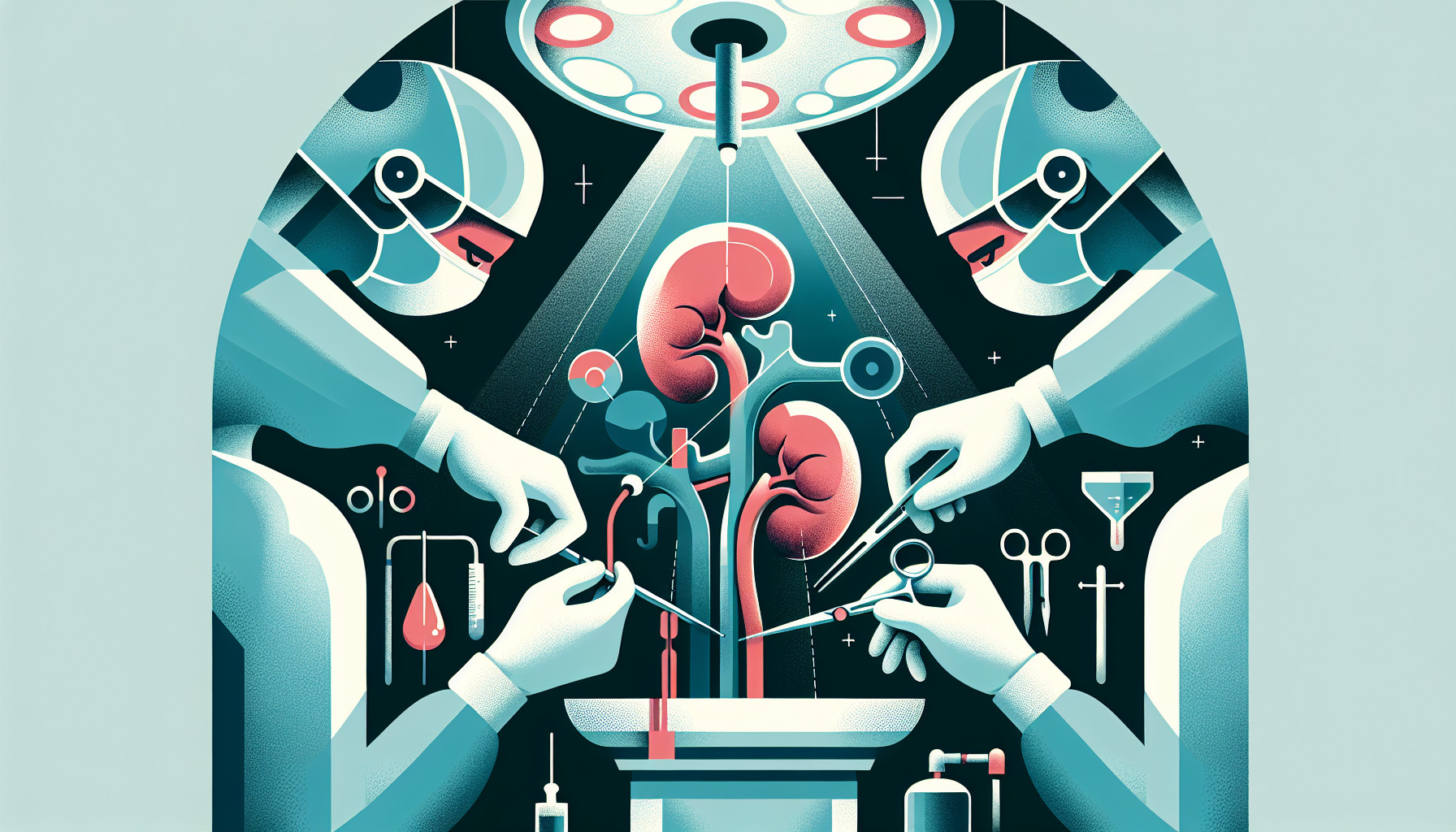Our Summary
This research paper talks about the use of remote surgery or “telesurgery” in the field of urology, specifically for removing kidney tumors. From March to October 2021, a surgeon in a top-tier hospital in Qingdao used a robot to perform 29 surgeries on patients who were located in eight different hospitals.
The robot was controlled by the surgeon over a 5G network, with the time delay between the surgeon’s actions and the robot’s response being only 26 milliseconds (ms) on average. The furthest distance between the surgeon and a patient was 187 kilometers.
To ensure the safety of the procedure, both the surgeon’s robot controller and the robot performing the surgery were overseen by network and mechanical engineers. Surgical assistants were also present with the patient to handle any complications.
The success of the procedure was measured by how many surgeries were completed without needing to switch to other methods or facing major complications during or after surgery.
The study concluded that using 5G technology and surgical robots is a promising new method for treating kidney tumors. This technique is not only safe and effective but could also potentially reduce healthcare costs and increase the quality of medical services available to patients.
FAQs
- How many surgeries were successfully performed using the telesurgery method between March and October 2021?
- What measures were taken to ensure the safety of the laparoscopic nephrectomy performed using a robot?
- How was the success of the telesurgery procedure measured in the study?
Doctor’s Tip
One helpful tip a doctor might give a patient about laparoscopic nephrectomy is to follow post-operative care instructions carefully to ensure a smooth recovery. This may include taking prescribed medications, avoiding strenuous activities, and attending follow-up appointments as scheduled. It is also important to stay hydrated, eat a healthy diet, and get plenty of rest to aid in the healing process. If any unusual symptoms or complications arise, it is important to contact your healthcare provider immediately.
Suitable For
Patients who are typically recommended for laparoscopic nephrectomy include those with kidney tumors, kidney cysts, kidney stones, kidney infections, or other kidney conditions that require surgical intervention. Laparoscopic nephrectomy is often recommended for patients who are in good overall health and are able to tolerate general anesthesia and the minimally invasive nature of the procedure. Additionally, patients with smaller kidney tumors or cysts that are confined to the kidney and have not spread to surrounding tissues are also good candidates for laparoscopic nephrectomy. It is important for patients to discuss their specific condition and treatment options with their healthcare provider to determine if laparoscopic nephrectomy is the most appropriate surgical approach for them.
Timeline
Before laparoscopic nephrectomy:
- Patient is diagnosed with a kidney tumor through imaging tests such as CT scans or MRIs.
- Patient undergoes consultations with urologists and surgeons to discuss treatment options, including laparoscopic nephrectomy.
- Pre-operative tests and evaluations are conducted to ensure the patient is a suitable candidate for surgery.
- Patient receives instructions on pre-operative preparations, such as fasting before surgery and stopping certain medications.
- Surgery date is scheduled, and the patient is admitted to the hospital on the day of the procedure.
After laparoscopic nephrectomy:
- Patient undergoes laparoscopic nephrectomy, where the surgeon makes small incisions in the abdomen to remove the affected kidney.
- Surgery typically lasts between 2-4 hours, depending on the complexity of the case.
- Patient is monitored in the recovery room before being transferred to a regular hospital room.
- Patient may experience pain and discomfort post-surgery, which can be managed with pain medications.
- Patient is discharged from the hospital within a few days and instructed on post-operative care, including wound care and activity restrictions.
- Follow-up appointments are scheduled to monitor the patient’s recovery and check for any complications.
- Patient resumes normal activities gradually as they recover from surgery.
What to Ask Your Doctor
Some questions a patient should ask their doctor about laparoscopic nephrectomy include:
- What are the benefits of laparoscopic nephrectomy compared to traditional open surgery?
- What are the risks and potential complications associated with laparoscopic nephrectomy?
- How long is the recovery time expected to be after laparoscopic nephrectomy?
- Will I need to stay in the hospital after the surgery, and if so, for how long?
- What is the success rate of laparoscopic nephrectomy for treating kidney tumors?
- Are there any alternative treatment options available for my condition?
- Will I need any additional tests or evaluations before undergoing laparoscopic nephrectomy?
- How experienced is the surgical team in performing laparoscopic nephrectomy procedures?
- What should I expect during the surgery and what is the expected outcome?
- Are there any specific post-operative care instructions I should follow to ensure a successful recovery?
Reference
Authors: Li J, Yang X, Chu G, Feng W, Ding X, Yin X, Zhang L, Lv W, Ma L, Sun L, Feng R, Qin J, Zhang X, Gou C, Yu Z, Wei B, Jiao W, Wang Y, Luo L, Yuan H, Chang Y, Cai Q, Wang S, Giulianotti PC, Dong Q, Niu H. Journal: Eur Urol. 2023 Jan;83(1):41-44. doi: 10.1016/j.eururo.2022.06.018. Epub 2022 Jul 9. PMID: 35817641
